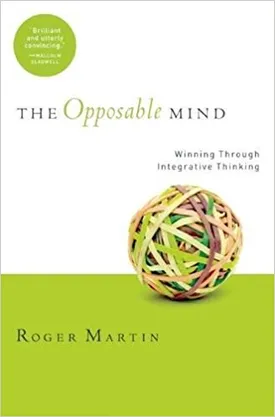The Opposable Mind: How Successful Leaders Win Through Integrative Thinking by Roger Martin
Since its initial release in 2007, the book “The Opposable Mind: How Successful Leaders Win Through Integrative Thinking” by Roger Martin has been an invaluable resource for leaders looking to make exponential leaps in their professional fields. In this comprehensive book, Roger Martin looks at the most successful leaders and companies and details the integrative thinking that they have embraced to make leaps in their respective fields.
Integrative thinking can be defined as a highly evolved form of thinking that involves rationality, intuition and synthesis. According to Martin integrative thinking and its results involve “taking the best from both ‘analogic’ and ‘digital’ forms of thought.” Through complementary rather than opposing approaches, successful leaders have the unique ability to meld the best of both worlds to create something expansive, successful and powerful. Through his research and in his book, Martin provides insight into how this type of integrative thinking is used to great success in the business world.
The first aspect of integrative thinking Martin focuses on is the ability of the leader to recognize and exploit ‘hidden’ options. By recognizing the ‘hidden’ options, the leader is able to recognize paths that others have not seen, thereby giving this leader a distinct advantage in the business market. In his writing Martin also discusses the necessity for the leader to be able to think around, not just through, situations. By thinking around, or laterally, leaders are able to view problems from several different angles and in the process offer unique and effective solutions.
Through integrative thinking, Martin notes the leader is not only able to pull the best from different approaches but to also consider different perspectives from different disciplines, this allows them to come up with creative and unexpected solutions that no one single discipline could establish on its own. By actively being open to different means and sources of knowledge, the leader is able to bring different concepts together and form a truly unique and successful solution.
Finally, Martin notes the importance of having a tolerance of ambiguity. This tolerance allows the leader to remain open to different ideas and allow the emergence of a potential new idea not previously considered. A leader must also be open to failure; without the ability to fail and learn, the leader will not be able to develop or utilize the skills necessary for effective integrative thinking.
Overall, “The Opposable Mind: How Successful Leaders Win Through Integrative Thinking” is an insightful look into the world of integrative thinking. Through his research and experience, Roger Martin has detailed the most important aspects of integrative thinking, allowing leaders the opportunity to strengthen their abilities and potentially reach professional success like never before. For any leader looking to make an exponential leap, “The Opposable Mind: How Successful Leaders Win Through Integrative Thinking” is essential reading.

